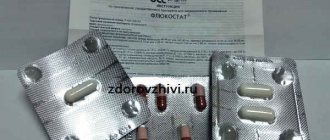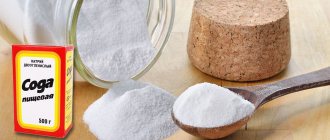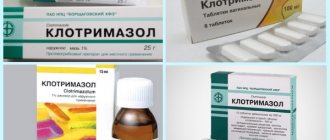Directions for use and dosage
The method of using Diflucan, dosage and frequency of use are determined by the attending physician depending on the severity of the disease, the presence of concomitant diseases and the need for simultaneous use of other medications. If the area of skin affected by the fungus is small, it is advisable to use medications for topical use in the form of ointments, creams or gels. Before using the drug, it is necessary to undergo tests to confirm mycosis.
Capsules
The medication in capsule form is used for skin fungus (including mycoses of the feet and groin area). The recommended dose is 100 mg once a week or 50 mg once a day. The duration of antifungal therapy, as a rule, ranges from 2 weeks to a month, however, if necessary, the duration of treatment can be increased to 5-6 weeks. For pityriasis versicolor, the recommended dosage is 3-4 capsules once a week for a month.
To prevent relapse of candidiasis and other chronic fungal infections, the recommended dose of Diflucan is 1-2 capsules 1 time per day, depending on the degree of risk of developing thrush symptoms. For patients at high risk of generalized lesions, the recommended amount of the pharmacological drug is 1-2 capsules 2 times a day.
Powder
For oropharyngeal candidiasis, the medication in powder form is prescribed on average 50-100 mg once a day for 10-12 days. If necessary, in patients with a marked decrease in immune responses, pharmacological therapy can be extended. For atrophic chronic oral thrush in elderly people associated with wearing dentures, the medicine is prescribed in a dosage of 50 mg 1 time/day for two weeks in combination with local antiseptic solutions.
Solution
The drug in the form of a solution is prescribed for the treatment of severe chronic infections with frequent relapses (usually in patients with immunodeficiencies). For deep endemic fungal infections, it may be necessary to use the drug at a dose of 400 - 500 mg/day for a year or more. The duration of therapy is determined, in this case, individually by the attending physician.
special instructions
Uncontrolled use of drugs containing fluconazole is accompanied by toxic changes in the structure of the liver, cirrhosis and failure of its functioning (especially in patients with serious concomitant pathologies). There was no dependence of the frequency of cases of development of hepatotoxic effects of the components of the drug Diflucan on the daily dose, duration of pharmacological therapy, or the age of the patient.
During treatment with Diflucan, patients may develop exfoliative skin reactions, such as Stevens-Johnson syndrome and toxic cutaneous necrolysis. The drug should be used with caution in patients with immunodeficiency virus (in the AIDS stage), because they are more likely to develop severe skin reactions when using antifungal medications. If a rash is detected in the patient, Diflucan should be discontinued.
When will Diflucan not have the desired effect for thrush?
The drug in question is one of the most effective drugs for candidiasis, however, some patients are faced with a situation where taking it is ineffective. This happens for various reasons.
- In case of relapse of the disease. At first there was an improvement, and then an exacerbation followed. Provoking factors: strong emotional disturbances and promiscuous sexual intercourse.
- With the wrong approach to the choice of therapy, in particular the scheme and duration of the course, single and daily dose. Most often, this phenomenon is observed when visiting an unqualified doctor or self-medicating.
- In the presence of chronic pathologies that occur hidden in the body. Diseases of this kind lead to a weakening of the immune system and prevent the rapid cure of thrush. The active substance, form and dosage of the drug in such situations do not matter.
- With a very advanced form of candidiasis. This stage of the disease occurs when a person not only did not undergo appropriate diagnosis and treatment in a timely manner, but also did not consult a doctor with this problem in principle.
Drug interactions
When used simultaneously with Warfarin, Diflucan increases its bioavailability by 12%, and therefore the development of side effects is possible: bleeding (hematomas on the skin, hemorrhages from the nose, gastrointestinal tract, hematuria). In patients receiving coumarin anticoagulants, their daily dosage should be constantly adjusted.
When taking Midazolam orally, the active component fluconazole significantly increases its concentration in the blood plasma and psychomotor effect. This effect is strongly pronounced after taking the medication orally. If concomitant treatment with benzodiazepines is necessary, patients taking medications containing fluconazole should be monitored for dosage changes of both drugs.
About the drug
The drug "Diflucan" for thrush is often prescribed by treating specialists due to the key features of the medication itself. Here are some of them:
- the ability to be quickly absorbed from the digestive system within 1.5-2 hours;
- Possibility of use together with all foods and antacids;
- uniform distribution throughout the body;
- relatively rapid removal of this drug from the human body, within 30 hours, almost unchanged.
In pharmacies, Diflucan can be found in several forms:
- in hard, gelatin capsules (1, 4 or 7 pcs.);
- in the form of powder for preparing a suspension (5 ml);
- or in the form of an injection solution (50, 100 or 200 ml).
The main active ingredient in all dosage forms of the drug is the antifungal substance – fluconazole. It helps reduce the enzymatic activity of fungi, destroys the membrane of fungal cells and significantly complicates the process of cell membrane growth and DNA molecule doubling, thereby eliminating the infection from the body completely.
Basically, all of the above-described dosage forms of Diflucan are well tolerated by patients. But in rare cases, you may encounter some side effects, which include:
- migraine and dizziness;
- disruption of the gastrointestinal tract: nausea, vomiting, bloating, diarrhea;
- muscle pain, weakness and lethargy;
- sudden hair loss;
- allergic skin rashes and itching;
- anaphylactic shock or Quincke's edema.
Diflucan is an effective treatment for thrush. Produced as:
- Capsules;
- Powder for making a suspension;
- Solution for injection;
- Suppositories.
The effect of the drug is due to the effect of fluconazole. The active component reduces the production of enzymes, reduces the intensity of metabolism in fungal cells, and destroys the protective shell. Effective against various types of fungi: yeast, mold, yeast-like.
Diflucan does not disrupt hormonal levels. It is quickly absorbed into the plasma, reaching the optimal content no later than an hour and a half. The active substance is effective for 24 hours. Fluconazole enters the cerebrospinal fluid, skin, tissues, and fluids produced by mucous membranes.
Pills
The convenience of using the medicine in capsule form is due to the fact that it can be taken at any time, including the period of menstrual bleeding. One capsule contains 50 or 150 mg of active substance. Eating does not affect absorption or effectiveness. Maximum effect after 30-90 minutes. The use of Diflucan tablets for thrush is indicated for mild forms, chronic cases, and a decrease in the body’s defenses.
Diflucan is available in the form of suppositories for thrush, each of which contains 400 mg of the active ingredient. Currently not available in pharmacies. Suppositories are effective for topical use.
The main purpose of Diflucan is the treatment of vaginal and genital candidiasis in women and men, as well as the treatment of mycosis and onychomycosis of the oral cavity.
This drug belongs to triazole antifungal agents, therefore it has a powerful composition to combat similar infections of various natures. Fluconazole has antibiotic properties, thanks to which the life processes of harmful microorganisms are suppressed.
The main advantages of Diflucan include the following factors:
- No negative impact on women's hormonal levels.
- It has various release forms, which allows the drug to be used for the treatment of thrush in a form convenient for the patient.
- Helps block the processes of synthesis of cell membranes of pathological microorganisms. Therefore, the drug does not simply suppress fungal infections, but fights the resulting pathogenic microflora.
- The effectiveness of the product in the fight against such diseases has been proven through clinical trials.
We will find out further what forms of release and composition Diflucan for thrush has.
Side effects and overdose
The drug Diflucan is well tolerated by patients, but the following side effects have been clinically identified with its long-term use:
- tachycardia:
- vomit;
- nausea;
- dizziness;
- rash;
- peeling, dry skin;
- alopecia areata;
- thrombocytopenia;
- anemia.
An overdose of the drug Diflucan is possible when its metabolites accumulate in the body due to impaired kidney function, liver disease with disruption of its normal functioning. In addition, patients who have a history of immune system diseases and long-term use of the medication simultaneously with antibiotics are susceptible to the strong effect of the medication (when taken orally).
pharmachologic effect
Fluconazole, found in Diflucan, is active against many pathogenic fungal infections. This substance is an inhibitor of sterol synthesis in fungal cells. Due to the suppression of sterol, the activity of microorganisms stops. Fluconazole acts exclusively on fungal cells without affecting human hormones.
Fungal infections quickly develop resistance to the drug. It is always necessary to complete treatment of the disease. Currently, Candida krusei is resistant to fluconazole. Fungi react differently to taking Diflucan. In most cases, results can only be achieved with long-term use. Various candidal lesions can be treated by using a loading dose of medication.
Be sure to read:
The drug Cetrin: instructions for use for adults and children
Diflucan analogs
If the use of Diflucan is not possible, then medications with a similar effect are prescribed. The following drugs are available on the pharmaceutical market and are used to treat candidiasis and other fungal infections:
- Fluconazole. An analogue of Diflucan for thrush, produced in Russia. It differs from Diflucan in lower cost and more frequent side effects. Available in the form of tablets for systemic therapy, ointments, and creams for local use.
- Mikosist. Pharmacological drug for combating fungal infections in capsule form. It is prescribed primarily for the treatment of pityriasis versicolor, cryptoccosis and for the prevention of mycosis in patients suffering from malignant neoplasms and immunodeficiencies.
- Itrazole The drug, which is available in tablets, is used to treat fungal infections on the skin and mucous membrane. It differs from Diflucan in having less toxic effects on the liver and kidneys, and is recommended for pharmacological treatment of fungus in children and adolescents.
Indications for use
The drug "Diflucan" has a fairly wide spectrum of action. Most often it is used in gynecology, to treat thrush, but it is also used in surgery, therapy, and dermatology. Indications for the use of Diflucan may be:
- candidiasis (thrush);
- nail or skin fungus;
- candidiasis of the oral mucosa and pharynx;
- inflammation of the glans penis caused by a fungal infection;
- mycoses of the skin of the feet and nail plate;
- invasive candidiasis or urinary tract candidiasis.
Diflucan price
The cost of Diflucan depends on the form of the drug, the degree of purification, the quality of the main active substance and auxiliary components of the drug. In addition, the price of a medicine may be influenced by the region and pharmacy in which it is sold. The cost can be set by the manufacturer. Check out the price of Diflucan in Moscow pharmacies:
| Diflucan release form | Name of pharmacy, Moscow | Cost, rubles |
| Powder for suspension, 5 sachets | Kalina Form | 520 |
| Solution for intravenous administration, 200 ml | Avicenna | 407 |
| Capsules, 4 pcs. | Moscow Pharmacy | 600 |
| Capsules, 6 pcs. | Rigla | 860 |
Treatment of thrush in men and women
This medication is very often prescribed for candidiasis of the genitourinary organs. Regardless of a person’s gender, this disease can be treated comprehensively. Diflucan is one of the main drugs in therapy. It is consumed in capsules.
Be sure to read:
Pulmicort for inhalation: instructions for use for children and adults
The dosage and treatment regimen depend on the form of the disease and the individual characteristics of the person. Shock dosages are usually used. The most effective regimen is a single dose of 150 mg.
In severe cases, the drug is used at a dosage of 150 mg every other day for 1 week. Additionally, you need to use external treatments. Women should use specialized suppositories, and men should use ointments and creams.
Reviews
Margarita, 40 years old
My husband noticed a coating on the head of his penis. The doctor said that it was candidiasis and prescribed Pimafucort ointment, but it did not help. The symptoms went away, but after stopping the use of the drug, they reappeared. The pharmacy advised me to treat candidiasis with Diflucan capsules. The medication worked quickly, and there was no more thrush.
Vladimir, 23 years old
After long-term treatment with antibiotics (he had pneumonia), I noticed strange peeling on the skin, which intensified over time, began to itch and hurt a lot. I got tested and the dermatologist said it was pityriasis versicolor. I prescribed ointment and Diflucan, the symptoms of the disease disappeared in about a week. There have been no exacerbations yet. I'm happy with the drug.
Alexander, 53 years old
I have a congenital genetic disease, due to which I suffer from secondary immunodeficiency. Chronic candidiasis is not uncommon for me; based on doctors’ reviews, I chose Diflucan in capsules. The medication helps me well to avoid exacerbation of a fungal infection. I’ve been taking it intermittently for several years now, there are no side effects, it’s a good remedy.
During pregnancy and lactation
The presence of candidiasis in pregnant women is common. Many expectant mothers are faced with a situation: to treat the disease during pregnancy or undergo a course of treatment with Diflucan after childbirth? Due to the impossibility of conducting research in this group of women, trials are prohibited. But clinical studies did not reveal the danger of the drug for women's health.
Candidiasis during pregnancy is dangerous for the child for several reasons:
- The disease progresses, affecting the reproductive organs, infecting the fetus and negatively affecting the child’s health.
- Unpleasant symptoms.
- Candidiasis is transmitted to the child in 90 percent of cases.
It is necessary to start a course of treatment with Diflucan in extreme cases and only with the permission of a doctor.











